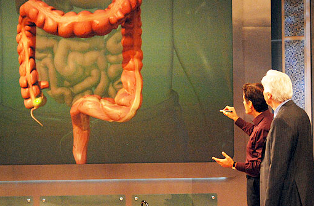November 17th, 2010 by DrRob in Better Health Network, Humor, True Stories
No Comments »

I did a little “self care” earlier this week. I did it by not caring for myself. I went to the doctor.
I was sitting in the waiting area for my appointment and saw the mother of one of my patients. “Why are you here?” she asked. “I have a doctor’s appointment,” I replied. She got a curious look on her face, asking: “Don’t you doctors just take care of yourselves? I thought that was what doctors did.”
We do take care of ourselves. In fact, we do it far more often than we should. Being your own doctor allows for a lot of denial. When you spend your day advocating healthy lifestyles after you had trouble finding pants that would fit in the morning, denial is necessary. “Do as I say, not as I do.”
I realize that this is hypocrisy — that is why I was at the doctor on Monday. My patients have noticed my expanding waistline, commenting on it more than I would wish. Certainly my pants get in the way of denial as well, not forgiving the fact that I have been under a whole lot of stress. Pants don’t accept excuses.
So I found myself in the unfamiliar experience of being the patient. Instead of closing my mind and emotions to my own body, I had to frankly assess what I was doing to it. Standing on the scale was as frank of an assessment as I would ever want. Read more »
*This blog post was originally published at Musings of a Distractible Mind*
September 3rd, 2010 by Jon LaPook, M.D. in Better Health Network, Health Tips, News, Research, True Stories
No Comments »
 Dr. Mehmet Oz just might be the last person on earth people would expect to get a colon polyp. He’s physically fit (he left me in the dust the last time we ran together), he eats a healthy diet, he doesn’t smoke, and he has no family history of colorectal cancer or colon polyps.
Dr. Mehmet Oz just might be the last person on earth people would expect to get a colon polyp. He’s physically fit (he left me in the dust the last time we ran together), he eats a healthy diet, he doesn’t smoke, and he has no family history of colorectal cancer or colon polyps.
But several weeks ago, when Mehmet had his first screening colonoscopy at age 50, I removed a small adenomatous polyp that had the potential to turn into cancer over time. Statistically, most small polyps like his don’t become cancer. But almost all colon cancers begin as benign polyps that gradually become malignant over about 10 to 15 years.
Since there’s no way of knowing which polyps will turn bad, we take them all out. The good news is there’s plenty of opportunity to prevent cancer by removing these polyps while they are still benign. But only about 63 percent of Americans between ages 50 and 75 get screened for colorectal cancer. Read more »
August 20th, 2010 by BarbaraFicarraRN in Better Health Network, Health Tips, Research
No Comments »

 We’ve all made the excuses: You can’t face the drive to the gym, you’re too tired at night, getting up in the morning is a chore, or it’s too hot or cold outside. So you cozy up on the couch in front of the television. If you’re a couch potato, you’re a gambler — with your life.
We’ve all made the excuses: You can’t face the drive to the gym, you’re too tired at night, getting up in the morning is a chore, or it’s too hot or cold outside. So you cozy up on the couch in front of the television. If you’re a couch potato, you’re a gambler — with your life.
Unfortunately you’ll need a big sofa because you’re not the only one whose heart isn’t in physical activity. About 60 percent of adults in the U.S. are not getting the exercise they need, according to a report from the U.S. Surgeon General.
It’s time to get up and face — or better yet, dance to — the music! Here are a few facts that may get you moving for your heart’s sake. Read more »
*This blog post was originally published at Health in 30*
August 14th, 2010 by John Mandrola, M.D. in Better Health Network, Health Tips, Opinion
No Comments »

If I was Surgeon General, I would follow the lead of our country’s first Mom, Michelle Obama. This is serious folks. We as an American society need to solve the obesity crisis, not just for our physical health, but for our country’s financial stability.
Reducing the spiraling costs of healthcare is wanted by all. So far, prevention of the diseases which contribute most to our healthcare costs, (heart disease, cancer and orthopedic issues, to name just a few) has been given only lip service, by our future supplier of healthcare — the American government.
It turns out that the mechanisms to reduce our most costly ailments are the same as those that mitigate obesity. It is like simple math. (If a=b, and b=c, than a=c.) If lifestyle choices reduce obesity, and less obesity means less consumption of healthcare for heart disease and cancer, than better lifestyle choices means less healthcare consumption. Bunches less. (See, simple math was not so useless.) It is for this reason that I believe the most productive way to reduce health care expenditures is to reduce obesity. Read more »
*This blog post was originally published at Dr John M*
May 25th, 2010 by CynthiaHainesMD in Better Health Network, Health Tips, Research
1 Comment »

“I never worry about action, but only about inaction.” — Winston Churchill
Winston Churchill was right: Experts are saying sedentary behavior is an epidemic, with the resulting health effects potentially devastating.
Lack of muscular activity is associated with higher incidence of obesity, cardiovascular disease, diabetes and cancer, as well as a heightened risk of death. And this is regardless of one’s level of structured physical exercise, according to the authors of an article published [recently] in the British Journal of Sports Medicine.
The team from Stockholm, Sweden, says that sedentary behavior has become synonymous with lack of exercise, but that this is inaccurate and misleading. Rather, sedentary behavior should be defined as whole body muscular inactivity. Read more »



 Dr. Mehmet Oz just might be the last person on earth people would expect to get a colon polyp. He’s physically fit (he left me in the dust the last time we ran together), he eats a healthy diet, he doesn’t smoke, and he has no family history of colorectal cancer or colon polyps.
Dr. Mehmet Oz just might be the last person on earth people would expect to get a colon polyp. He’s physically fit (he left me in the dust the last time we ran together), he eats a healthy diet, he doesn’t smoke, and he has no family history of colorectal cancer or colon polyps.
 We’ve all made the excuses: You can’t face the drive to the gym, you’re too tired at night, getting up in the morning is a chore, or it’s too hot or cold outside. So you cozy up on the couch in front of the television. If you’re a couch potato, you’re a gambler — with your life.
We’ve all made the excuses: You can’t face the drive to the gym, you’re too tired at night, getting up in the morning is a chore, or it’s too hot or cold outside. So you cozy up on the couch in front of the television. If you’re a couch potato, you’re a gambler — with your life.









